Nestled in the mist-covered foothills of the central mountain range, Ruanciao community (軟橋) in Hsinchu County’s Jhudong Township (竹東) is virtually devoid of young people, but artist Wu Tsun-hsien is coaxing the Instagram generation back by transforming local homes into a canvas of color.
Dipping his brush into a tin of beige emulsion, he carefully applies new layers of paint to his latest production — a vibrant rural scene depicting farmers in traditional weave hats tending to a flock of animals.
Behind him an elderly villager with a walking stick shuffles his way down the main street, which is plastered with Wu’s colorful paintings.
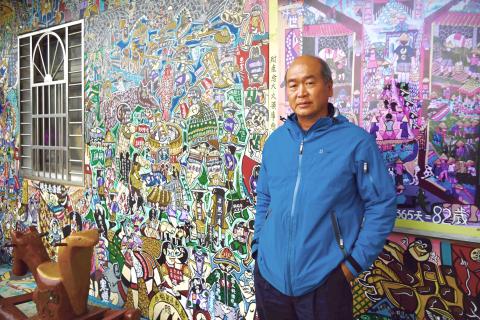
Photo: Sam YEH / AFP
“This village is full of old people,” the 55-year-old said, explaining how the vast majority of youngsters — including his own children — have moved to cities, leaving elderly residents listless and lonely.
However, paintings have started to bring young visitors — always keen for a selfie in a photo-friendly location — back.
“These drawings attracted many tourists to come visit. The old people who were left here are no longer so bored. This was my biggest gain,” Wu said.
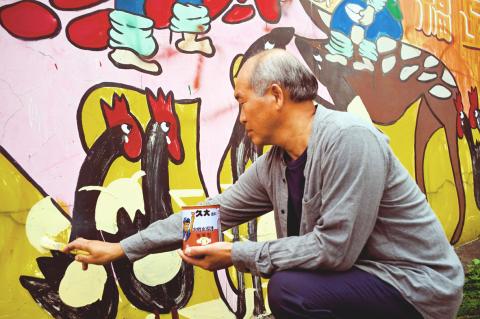
Photo: Sam YEH / AFP
Wu is not alone in this adopting this strategy.
There are now half a dozen so-called “graffiti villages” in Taiwan that have been festooned with artwork in a bid to inject some life into rural places that have been emptied of young people.
Like many industrialized nations, Taiwan’s remarkable economic transformation over the past few decades has upended rural communities and unleashed huge demographic changes.
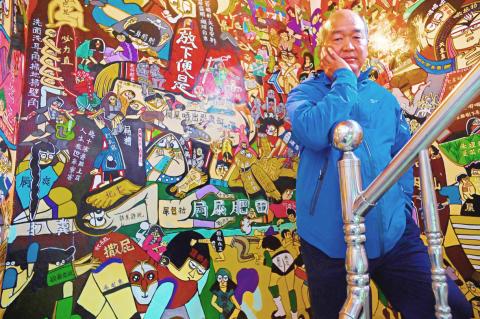
Photo: Sam YEH / AFP
“It’s perhaps a more recent phenomenon than it would have been in some other places,” said Shelley Rigger, an expert on Taiwan at Davidson College in North Carolina, who said much of the nation’s industrial manufacturing stayed in the villages.
“People sewed Barbie doll clothing in their houses and then carried it down to a packaging plant in the middle of a village,” she said, as an example.
Ruanchiao, for example, used to churn out temple offerings made of paper.
However, once much of the manufacturing shifted to China in the late 1990s and Taiwan moved up the value chain, many of those jobs left.
“That’s when you see rural areas kind of emptying out,” Rigger said.
Taiwan’s 23 million population is also rapidly aging and the birthrate has plummeted.
The Wu family have experienced this flight first hand.
The ancestral home is occupied by his wife’s father, 81, and mother, 72, who still work a few plots of land in the hills above the village growing organic vegetables.
However, Wu’s own children both went to university and have left, one to Australia, the other to a nearby city.
Wu’s wife, Fan Ai-hsiu, said that their bid to draw Instagram-happy crowds of youngsters was less about economics and more about giving her parents something to look forward to.
“They want to have conversations with people, that’s what they miss, it’s not about money,” Fan said.
It was not initially an easy task to persuade fellow villagers to use their houses as a canvas.
“People here are fairly conservative, but once the first few paintings went up, they could see it brought people in,” she said.
Most of Wu’s paintings in the village stick to rural pastiches or traditional symbols of good fortune.
It is the family home where he really gets to express himself — and which has quickly drawn a mass following on social media.
Perched on a slope overlooking the village, the whole house is covered in images, many of which detail Wu’s politics.
He is an avid believer that not enough is being done to tackle climate change, so some of the scenes show apocalyptic scenes of environmental devastation. Others are commentaries on social issues like gay marriage — which he opposes — or how elderly people are treated in an increasingly consumerist society.
“This mural depicts the present Taiwanese corrupt society,” Wu said as he walked along a huge painted wall featuring hundreds of images.
“This one is society’s mayhem due to mobile phones, computers and television ... and this one is our cultural loss where many of our Hakka young generations don’t know the culture,” he said.
Evelyn Sun puts on art and food events in Taipei and found out about Wu’s paintings via social media.
She visited with friends, who all soon found themselves sitting around a table with the Wu family, eating traditional Hakka vegetable dishes and tucking into eggs boiled in a secret recipe of local herbs.
“Taiwan has many graffiti villages that are beautiful scenic spots where people will just leave after taking pictures, but I realized when I came here that every mural here is depicting a social problem faced by society,” the 25-year-old said.
Sun said she hoped that other young Taiwanese would explore the nation’s rural villages more often.
“These people are our culture, they are our history, we have to get to know them,” she said.

‘NON-RED’: Taiwan and Ireland should work together to foster a values-driven, democratic economic system, leveraging their complementary industries, Lai said President William Lai (賴清德) yesterday expressed hopes for closer ties between Taiwan and Ireland, and that both countries could collaborate to create a values-driven, democracy-centered economic system. He made the remarks while meeting with an Irish cross-party parliamentary delegation visiting Taiwan. The delegation, led by John McGuinness, deputy speaker of the Irish house of representatives, known as the Dail, includes Irish lawmakers Malcolm Byrne, Barry Ward, Ken O’Flynn and Teresa Costello. McGuinness, who chairs the Ireland-Taiwan Parliamentary Friendship Association, is a friend of Taiwan, and under his leadership, the association’s influence has grown over the past few years, Lai said. Ireland is
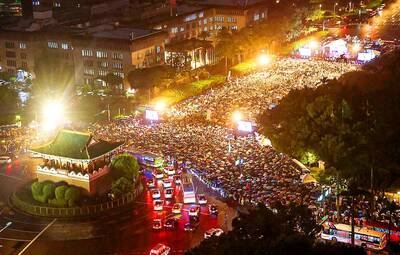
FINAL COUNTDOWN: About 50,000 attended a pro-recall rally yesterday, while the KMT and the TPP plan to rally against the recall votes today Democracy activists, together with arts and education representatives, yesterday organized a motorcade, while thousands gathered on Ketagalan Boulevard in Taipei in the evening in support of tomorrow’s recall votes. Recall votes for 24 Chinese Nationalist Party (KMT) lawmakers and suspended Hsinchu City mayor Ann Kao (高虹安) are to be held tomorrow, while recall votes for seven other KMT lawmakers are scheduled for Aug. 23. The afternoon motorcade was led by the Spring Breeze Culture and Arts Foundation, the Tyzen Hsiao Foundation and the Friends of Lee Teng-hui Association, and was joined by delegates from the Taiwan Statebuilding Party and the Taiwan Solidarity
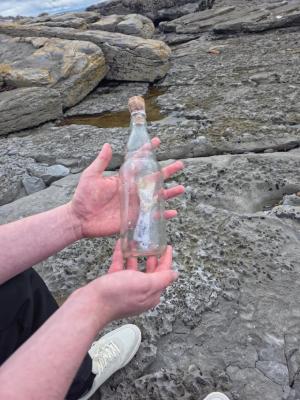
An SOS message in a bottle has been found in Ireland that is believed to have come from the Taiwanese captain of fishing vessel Yong Yu Sing No. 18 (永裕興18號), who has been missing without a trace for over four years, along with nine Indonesian crew members. The vessel, registered to Suao (蘇澳), went missing near Hawaii on Dec. 30, 2020. The ship has since been recovered, but the 10 crew members have never been found. The captain, surnamed Lee (李), is believed to have signed the note with his name. A post appeared on Reddit on Tuesday after a man

A saleswoman, surnamed Chen (陳), earlier this month was handed an 18-month prison term for embezzling more than 2,000 pairs of shoes while working at a department store in Tainan. The Tainan District Court convicted Chen of embezzlement in a ruling on July 7, sentencing her to prison for illegally profiting NT$7.32 million (US$248,929) at the expense of her employer. Chen was also given the opportunity to reach a financial settlement, but she declined. Chen was responsible for the sales counter of Nike shoes at Tainan’s Shinkong Mitsukoshi Zhongshan branch, where she had been employed since October 2019. She had previously worked